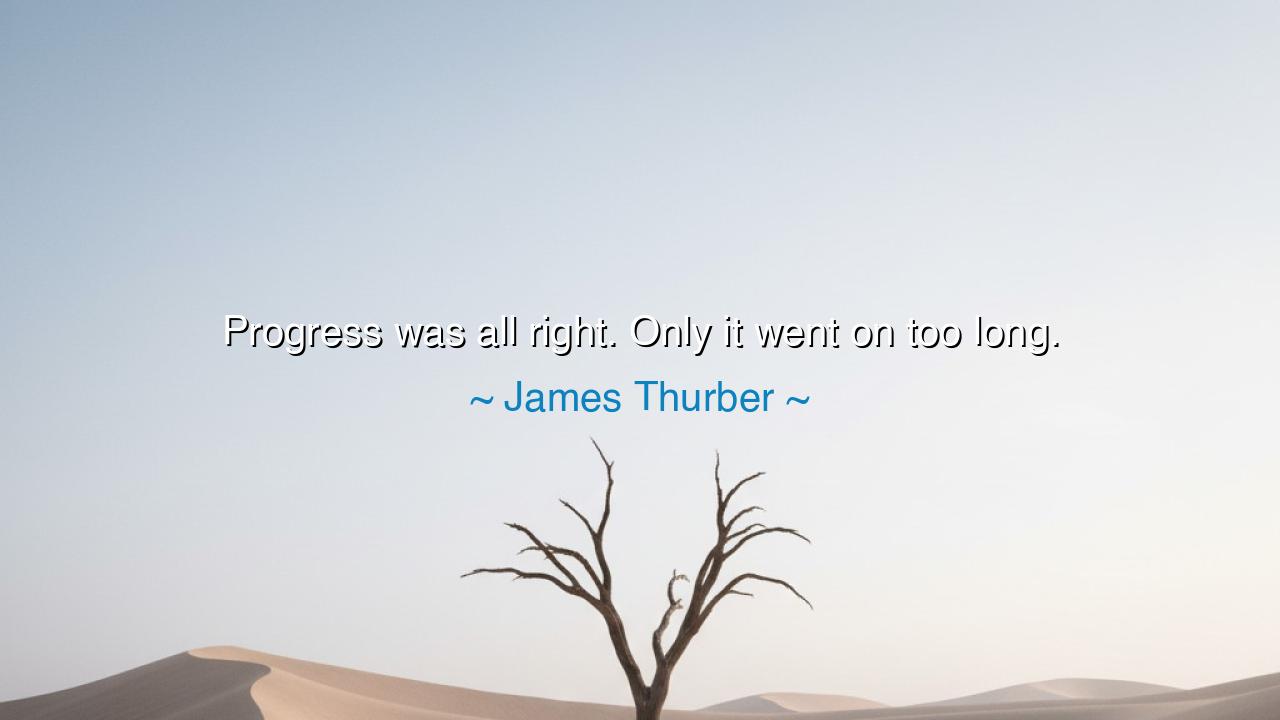
Progress was all right. Only it went on too long.






"Progress was all right. Only it went on too long." – James Thurber
In the long march of human history, we find that progress has often been the guiding star of civilization, pushing us forward, ever upward, toward greater understanding and mastery over the world around us. Yet, in the words of James Thurber, there lies a warning—that the very force which drives us forward can also overwhelm us. Progress, while it brings with it growth and advancement, can sometimes extend beyond its natural course, becoming a force of excess, leaving us not only with benefits but with unintended consequences. Thurber’s statement reflects a deep truth about the nature of human ambition: that in our pursuit of betterment, we must also remain mindful of the balance between change and contentment, between movement and reflection.
In the ancient world, the concept of progress was often linked to the pursuit of wisdom and the improvement of the human soul. The Greeks, in their philosophical inquiries, saw progress as something that should always lead to a deeper understanding of the self and the cosmos. But they also recognized the dangers of excessive desire—that to seek progress without understanding the limits of one's desires could lead to a kind of hubris, a dangerous arrogance that pushes one beyond the natural boundaries of human existence. Just as Icarus flew too close to the sun, so too do we sometimes chase progress without considering the consequences of our relentless pursuit.
Consider the story of Rome, whose rise to power is a testament to the power of progress in engineering, military strategy, and law. Yet, as Rome expanded, so did its internal pressures. What began as an empire built on the principles of order and innovation eventually became a machine that could no longer sustain itself. The very progress that had driven it to greatness became the cause of its eventual decline. Thurber’s words echo this ancient wisdom: progress is not inherently good or bad—it is the manner in which it is pursued, and the awareness with which we embrace it, that determines its ultimate outcome.
The idea that progress can go on too long calls attention to the fact that all things, even the most beneficial, have their natural limits. The ancient Chinese philosopher Laozi famously taught that in nature, there is a balance between forces, and that going beyond that balance leads to disruption. In his text, the Tao Te Ching, Laozi writes that one must know when to stop, for not knowing when to stop leads to loss. The desire to push forward, to continue progressing without reflection, can lead us down a path where the original goal is lost in the chase itself. Thurber captures this sentiment perfectly: progress is valuable, but its excess can obscure its true purpose.
Consider the example of the Industrial Revolution, a period of immense progress in science, industry, and technology. The machines, the steam engines, the factories—all brought immense benefit to human society, allowing for the mass production of goods and the expansion of wealth. Yet, in the wake of this progress came the pollution, the urban squalor, and the dehumanization of labor. The very progress that had lifted people to new heights also brought about new challenges that no one had foreseen. Just as Rome expanded too far and Icarus flew too high, so too did the Industrial Revolution show us that progress, unchecked, can often overshoot its own goals, leaving us with unintended burdens.
The lesson we must learn from Thurber’s observation is one of awareness—that progress, though vital for the advancement of society, must be pursued with balance and reflection. It is not enough to simply move forward without considering where we are going and whether the progress we are making is serving the deeper needs of the human spirit. Like the ancients, who valued wisdom and self-awareness, we must learn to recognize when our pursuit of progress has become too monstrous, too disconnected from the original values that guided us. Just as we honor the lessons of history, we must also learn to steer our future with caution, ensuring that our growth does not outpace our wisdom.
Let us then embrace progress in our own lives, but let us do so with awareness of its limits, of its potential consequences, and of the balance we must maintain between striving for more and appreciating what we have. Like the wise philosophers of old, we must seek not just to advance, but to understand the impact of our actions, to move forward with purpose, and to pause when we need to. For it is in the reflection upon our progress that we find true wisdom—and it is in knowing when to stop that we ensure our progress leads us not into excess, but toward a future where balance, fulfillment, and human dignity are preserved.






AAdministratorAdministrator
Welcome, honored guests. Please leave a comment, we will respond soon